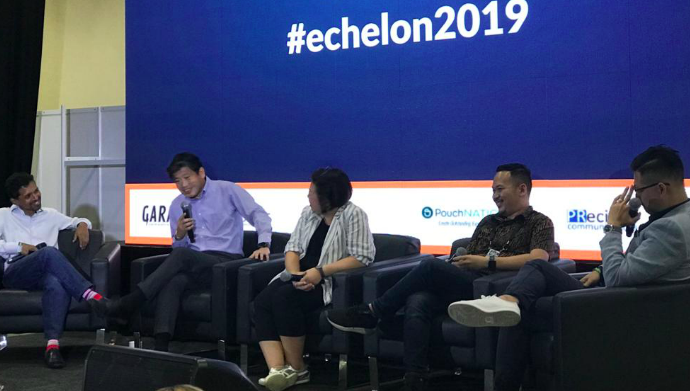The definitions of these technologies are no longer important; what is important is their applications in the common man’s life

The definitions of enterprise technologies like IoT, Artificial Intelligence, Cloud and Big Data have mostly been out of the common man’s knowledge and understanding. The common man is more interested in the applications of these technologies in their daily lives, rather than their definitions.
A panel session held on the ‘FUTURE’ stage on the first day of Echelon Asia Summit 2019 made an attempt to explain these things in simple terms for the masses to understand. Aptly titled “The ABCs of Enterprise Tech: Artificial Intelligence, Big Data, Cloud, Cybersecurity and IoT”, the discussion focused on decoding and busting myths around these technologies.
The panelists comprised Weldon Fung, Social Director, Meltwater for Southeast Asia; Andri Yadi, Co-founder and CEO, DycodeX; Michelle Yeo, Executive Co-founder, DATAVLT; and Dr. Keiji Yamada, Senior VP and Head of NEC Labs Singapore. The session was moderated by Tinmen Capital Co-founder Murli Ravi.
Sharing his thoughts, Meltwater’s Fung said Big Data has become a throw-away term these days, adding that the billions of megabytes of data being generated on a daily basis is useless unless there is value. “There are five ‘V’s of Big Data: velocity, veracity, variety, volume and value. Among these, ‘variety’ is especially interesting. The amount of data we collect from things like IoT and internal system means there is a huge variety of data.”
Also Read: What will the third-wave of artificial intelligence look like?
“About 2.5 quintillion bytes of data get generated a day now. All this data is useless unless there is value. We have already moved away from the contextual application of Big Data. The term ‘Big Data’ is no more important. What is more important is the applications of these technologies in enterprises,” he added.
DATAVLT’s Yeoh agreed with him, and raised doubt about the readiness of the world to analyse the massive amount of data generated each day. “The amount of data we generate, read, put out and receive is huge and exponential. About 3.5 billion IoTs will be flushed out into the market in the next three years. What worries me is that who is going to do the analysis of all this data and how many countries around the world are actually digitised enough to make use of this data for their benefits, as well as for the benefits of consumers.”
She also talked about the Cloud applications. To a question of the moderator, she said people nowadays have taken Cloud for granted without fully unlocking its potential. “Back in the 90’s, enterprises had to lay their own infrastructure and had to hire IT guys and engineers to manage and maintain this, but now you don’t need any of them anymore. Cloud has replaced all these things.”
The panelists also discussed IoT. According to DycodeX’s Yadi, IoT is not just about the technology but is about scale. “It is about massive scale. IoT is all about automating and collecting data in order to make sense of it.” He also said convergence of IoT and AI is the future and has huge potential. “AI and IoT are not something that can be separated. When you put AI into IoT, you will have privacy, you will get the decision or even suggestion and recommendations right at the device itself.”
All the panelists agreed on a point that that technologies and its applications need to be explained better for the layman to understand. In their opinion, enterprises should be willing to allow their clients (retailers, merchants, etc.) to “taste” their products. “Don’t be afraid to give a taste of your product to your potential customers. You should show them a little bit of the taste of your product and its features. It is good to showcase. The client can then differentiate between your product and your competitors’, and can make an informed choice,” said Yeo.
Talking about the challenges faced by enterprise-tech providers, the panelists agreed that they find it hard hiring talent and building trust. “Hiring talent is the most difficult part for an enterprise tech company. Other than this, the market is not yet grown. Then there is lack of trust and lack of urgency among clients,” said Yadi, who is based in Indonesia.
The post Decoding AI, IoT, Big Data and Cloud for the masses at Echelon 2019 appeared first on e27.